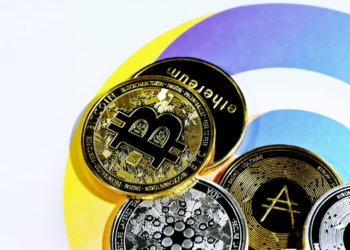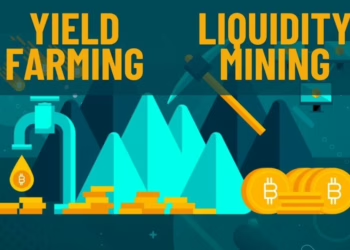Last updated on December 15th, 2022 at 12:42 pm
Decentralized finance (DeFi) has evolved into a multibillion-dollar industry that is remarkably disrupting finance systems across the globe. One of the factors contributing to DeFi’s phenomenal growth is the introduction of decentralization into the financial sector.
Traditional finance (TradFi) is typically controlled by centralized entities such as banks. These centralized entities facilitate payments, maintain deposits, offer loans, etc. while charging specific fees for the services provided.
The services offered by TradFi institutions are often based on customer personas. Wealthy customers with excellent credit ratings or large deposits have access to a broader range of financial services than average customers.
This centralized system has been shown to limit financial inclusion, as the average person is often unable to access the full suite of services offered by these institutions.
Another factor discouraging financial inclusion is the “hoops of red tape” that must be jumped through before access to said financial services is possible. These drawbacks of the centralized finance system have been shown to hamper wealth creation and financial freedom for a larger part of the population.
The goal of DeFi is to change this narrative by involving the community in a way that eventually puts users in charge of their finances rather than relying on intermediaries.
Decentralized finance eliminates the need for intermediaries (such as banks) by allowing people, merchants, and businesses to conduct financial transactions using emerging technologies such as distributed ledger technology (DLT).
DLT facilitates peer-to-peer (P2P) payments, reducing transaction time and costs. DeFi has recently evolved to provide additional financial services such as lending, staking, yield farming, and insurance.
DeFi presents users with a vast array of new opportunities, but it is also riddled with unfamiliar terms that may be intimidating to those new to the space.
To make the most of this financial revolution, it’s crucial to understand how decentralized finance alters our preconceptions of finance. The best place to start is by learning some common DeFi terms.
This article outlines and explains general DeFi terms to enable enthusiasts to learn more about the industry and its numerous exciting opportunities.
Smart Contract
A smart contract is a blockchain-based computer program that can self-execute when specific criteria are met. As a result, contracts between a buyer and seller (or token holder and protocol) are directly incorporated into lines of code.
Smart contracts can be seen as the building blocks of DeFi. They enable advanced interoperability between numerous financial products without the need for third-party intermediaries.
Theoretically, once a smart contract is published to the blockchain, decentralized programs (dApps) can function without much manual intervention. Yearn.finance is an example of a DeFi system that uses smart contracts to maximize profits for yield farmers and liquidity providers.
Collateral
Many DeFi platforms require users to provide collateral in one cryptocurrency or token (for example, Ether for DAI) in order to borrow in another cryptocurrency or token.
This is analogous to putting your house up as collateral for a bank loan.
For a DeFi loan, you will typically need to put up a bigger percentage of a cryptocurrency or token as collateral, such as $100 in ETH for $70 in DAI (i.e., 140% LTV or loan to value). This helps maintain the system’s stability.
dApp
DeFi is powered by decentralized applications (dApps). Applications (also known as “apps”) are usually “centralized,” meaning they are created, maintained, and controlled by a single entity, most often a business. Facebook is an example of a centralized application created by Meta, which also manages the servers where the app’s data is stored.
The data for a dApp is somewhat decentralized because it is stored on a blockchain rather than in a database on a server controlled by the company that created the app.
Centralized social media platforms, such as Instagram, are typically designed in such a way that the app developer has complete control over who can use the site and what can be posted on it.
A decentralized platform, on the other hand, creates a structure that allows users to control the content they see without affecting what others see, and access to the app is not restricted.
Decentralization is not a singular concept. There are different levels of decentralization, which means that some dApps are run and controlled by people who are not connected to the network.
Other dApps, such as Tectonic and VVS Finance, provide additional financial capabilities.
AMM (Automatic Market Maker)
An automated market maker (commonly referred to as a protocol DAO) is a decentralized exchange that uses an algorithm to manage liquidity rather than an order-matching system.
A centralized exchange (CEX) matches the buying and selling orders placed by traders by using a central order book. For instance, when a buyer decides to buy 1 BTC for, say, $25,000, the CEX ensures that it finds a trader willing to sell it at the buyer’s preferred exchange rate.
AMMs, on the other hand, use smart contracts to build their liquidity pools for trades. The goal is to reduce slippage and ensure there is always cash on hand.
Liquidity Pools
AMMs use liquidity pools. But where does the liquidity come from?
Anyone can provide liquidity to an AMM protocol as long as they can supply the token pairs specified by the smart contract; these individuals are referred to as “Liquidity Providers” (LPs).
These LPs create markets and liquidity pools by introducing two tokens of equal value into a pool.
Liquidity providers are compensated with LP tokens. For instance, when liquidity providers deposit funds into a UniSwap pool, they receive UniSwap’s LP tokens for that pool. LP incentives, however, differ from protocol to protocol.
The LP tokens could also be native or governance tokens. LP tokens are required for asset redemption but can also be used to mine or yield farm liquidity.
Wallet
Many people still struggle to understand the various types of wallets and how to use them.
Wallets are classified into two categories based on custody: custodial and non-custodial. The primary distinction between the two is that in custodial wallets, a third party holds users’ private keys on their behalf, while in non-custodial wallets, users have complete ownership, possession, and control over their assets. Among the various types of wallets are:
Hardware Wallets
These are wallets where users’ private keys are stored on a physical device, such as Trezor, Ledger, or other similar devices.
Web3 Wallets
These are also known as self-custody wallets. They provide users with access to the next generation of internet applications. For example, MetaMask is a browser plugin that acts as an Ethereum wallet, allowing users to store Ether (ETH) and other ERC-20 tokens.
Smart-Contract Wallets
Rather than giving the customer a public and private key combination, these wallets exist as software on the blockchain. Examples include the DeFi Smart Accounts offered by InstaDapp, Gnosis Safe, Argent, etc.
Stablecoins
Stablecoins are designed to eliminate price volatility by maintaining a fixed value. The types of stablecoins include:
Fiat-Backed Stablecoins
Examples include TrueUSD and Tether (USDT). These stablecoins are backed by dollar deposits and have a 1:1 peg to the US dollar.
Crypto-Backed Stablecoins
Examples include DAI, whose reserves are held in ETH despite being pegged to the US dollar.
Commodity-Backed Stablecoins
These stablecoins are backed by commodities. For example, Digix is backed by gold.
Non-Collateralized Stablecoins
These are also referred to as “algorithmic stablecoins.”
Order Books
Every centralized exchange has a collection of available orders called an order book. Order books help to display purchase and sell orders for each cryptocurrency.
Every centralized exchange has order books with some numbers highlighted in green and others in red.
The prices established by other traders to purchase the coin at that moment are indicated in green.
Sell orders, indicated in red, represent the prices at which traders want to resell the cryptocurrency they purchased. The most recent prices are also displayed in order books.
Tokens
Coins differ from tokens in one way: coins have their own distinct blockchains, but tokens do not.
There are various types of tokens. The most widely used forms of tokens are:
ERC-20 Tokens
Tokens that adhere to the ERC-20 standard are known as ERC-20 tokens. In essence, all tokens on the Ethereum network must conform to this design.
BEP-20 Tokens
BEP-20 is the Binance Smart Chain standard. Tokens from other blockchains can be migrated to the Binance Smart Chain in the form of BEP-20 tokens.
Yield Farming
In summary, yield farming involves users (liquidity providers) depositing crypto assets in a liquidity pool.
These assets (liquidity) are used to fund routine DeFi platform operations.
Those who want to purchase, sell, or obtain loans will be able to do so as a result of the funds that the users contributed to the pool. The liquidity providers will also earn interest on their investments as compensation.
Gas or Gas Fees
“Gas” is the term used to describe the fee required to execute a transaction on the Ethereum blockchain.
When discussing gas fees, the amount is usually expressed in “gwei.” Cryptocurrencies often also adopt new names for their smallest units, similar to how the dollar has a distinct name for its smallest base unit (the cent).
For Bitcoin, the amount is considered in “sats,” while the corresponding term for Ethereum is “wei.”
The “gas fee” is the amount of gwei a user must spend on a transaction, and it varies depending on how busy the network is.
TVL (Total Value Locked)
Total Value Locked (TVL) refers to the total amount of digital assets locked in various DeFi protocols.
The DeFi TVL is a critical metric for determining the value of the entire DeFi ecosystem as well as the stability of a particular project. For example, if a user deposits $6000 in ETH on Yearn Finance, the amount deposited will be a part of the DeFi TVL.
In Conclusion,
- Unlike traditional finance (TradFi), which is controlled by a few centralized entities and provides low incentives to users, DeFi has opened up a whole new universe of opportunities, allowing more people to participate in the financial system than ever before.
- Although DeFi may appear puzzling to those new to the industry, newcomers can confidently explore the industry and take advantage of the new services it offers if they take the time to understand a few key concepts.
- This article defines some of the most important terms in the DeFi industry to help you understand it better.
If you would like to read more articles like this, visit DeFi Planet and follow us on Twitter, LinkedIn, Facebook, and Instagram.
“Take control of your crypto portfolio with MARKETS PRO, DeFi Planet’s suite of analytics tools.”




















